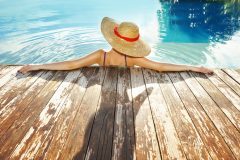Leisure sickness – not exactly an oxymoron!

I know that many of you, like me, tend to take some time off around this time of year to avoid Melbourne’s winter, so here is food for thought. Leisure sickness is a relatively new area of research and in a pilot study investigating its prevalence, phenomenology, and background, Vingerhoets et al. identified risk factors to be a high workload, the inability to adapt to a non‑working situation (sad but true), a need for high achievement, and a sense of responsibility with respect to work.
Many of you I am sure, have from time to time, experienced symptoms of ill health during weekends and holiday periods, when adrenaline which has previously kept you going is switched off, and symptoms such as fatigue, nausea, headache/migraine and cold and ’flu-like symptoms set in.
The onset of leisure sickness is often associated with a stressful and busy period, which of course, commonly occurs prior to a holiday, and is also associated with a longer average work week and a higher self-reported workload, job stress, and inability to cope efficiently with stress.
Supporting the stress response particularly via the adrenals (see newsletter February 2017 re adrenal support), immune system and increasing general resistance can help alleviate or lessen the impact of leisure sickness.
Addressing exhaustion and insomnia
Withania is a wonderful adaptagenic herb, and possesses significant anti-stress properties with a number of trials supporting the use of Withania in anxiety, depression and insomnia.
As discussed in February’s newsletter, Rhodiola and Siberian Ginseng also have similar properties, with Rhodiola having the added advantage of enhancing exercise performance.
Melissa (lemon balm) has also demonstrated to significantly reduce insomnia, improving both sleep onset and maintenance in stressed individuals.
B complex vitamins and the mineral magnesium have also been shown to improve perceived stress and anxiety compared to placebo in stressed individuals, as well as improve mood and fatigue following a multi-tasking exercise.
Relieving tension, agitation and anxiety
Oral administration of lavender oil has been shown to significantly reduce anxiety symptoms in generalised anxiety disorder, including restlessness, tension and sleep disturbances. Skullcap and lemon balm have also been proven to reduce tension, agitation and possess mood-enhancing properties.
Enhancing immunity
Mushroom extract, zinc, vitamin C and Andrographis support the immune response and enhance our Natural killer cell and Helper T cell response to infection. Withania and Siberian Ginseng are not just adaptogenic but are also immunomodulating botanicals.
Saccharomyces cerevisiae is a probiotic with significant immune-enhancing properties. High levels of physical stress is associated with immune suppression and increased incidences of upper respiratory tract infection (URTI).
Following completion of a marathon, 75 subjects consumed either placebo or a Saccharomyces extract and results showed a significant reduction in the frequency of URTI symptoms. After two weeks, 68% of subjects assigned to the placebo reported symptoms associated with URTIs, whilst this number was only 24% in the treatment group. At four weeks, URTIs were reported in 24% of subjects in the placebo group and 8% in the treatment group. Subjects in the treatment group also reported significantly improved mood, fatigue and tension compared to the placebo.
So, important to pre-plan the busy period up to a holiday sojourn. A few simple supplements and herbs, can ensure a leisure time of excellent health and calmness.
